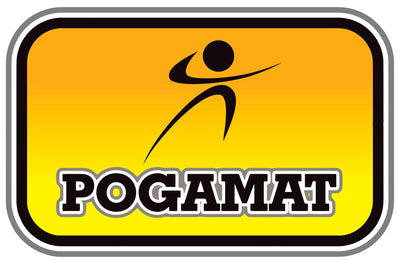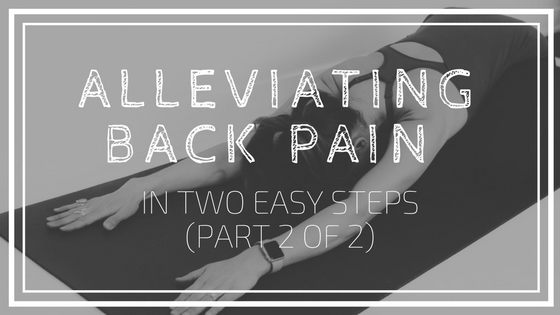
Back pain got you down? Consider yourself in good company! As stated in our previous post, one-half of all working Americans admit to having back pain symptoms each year. Back issues can result from a variety of things including poor posture, lack of movement, stress, stiff or pulled muscles, health conditions, poor health, injury, etc. Back pain can be long-term or it can be temporary. It comes in many various forms and is not something to take lightly or mess around with.
Chronic back pain can be extremely frustrating and often times defeating because you can try a number of things to help with little to no relief. If you are experiencing back pain that is severe or prolonged, your best bet is to consult with your doctor before doing anything else. That being said, there are two ways that I was able to get rid of my back pain almost indefinitely.
In part one, we discussed back pain at length and I told you my personal battle with it. We also gave you a great tip on how to deal with back pain and a potential solution to help alleviate some of the pain. That solution was to invest in a good mattress specific for people who experience pain. You are in bed many hours of your day and I can’t tell you enough how much of a difference a good mattress can make on your back. This is something to be mindful of regardless of whether you have back pain or not. Anyone with a bad back (or really anyone at all-particularly someone with sore muscles of any kind) could benefit from a high-quality mattress.

STEP 2 IN ALLEVIATING BACK PAIN
We left off telling you there was a second option to try, in conjunction with that first tip, to help reduce back pain. Numerous studies have shown the power of yoga in relieving an achy back. A study published in the Archives of Internal Medicine have discovered that practicing yoga or intensive stretching may improve chronic lower back pain and reduce the need for pain medications. The study shows 12 weeks of weekly yoga classes improved back function and reduced symptoms in people with chronic lower back pain. The pain reduction continued six months after the classes began and participants were able to use less medication to manage their lower back pain. Researchers say it's the largest study to date on yoga for back pain.
Studies published in the Annals of Internal Medicine show that yoga, which emphasizes stretching, strength, and flexibility, can relieve back soreness and improve function and can also help to reduce the need for medication. It is recommended to first try a natural route to curing an ailment and avoiding pills at all costs.
I can personally testify to yoga helping to alleviate my own struggle with back issues. When I first got into yoga I was pretty miserable due to ongoing back pain that resulted from a combination of past injuries and to my job at the time hunched over a computer screen. I began hot yoga and noticed a difference in my body almost immediately. After each class, I could feel my muscles elongating and getting stronger and my posture was improving. I was feeling reduced pain at work and at night when I was trying to sleep.
I fell off the yoga bandwagon for a bit when I moved out of the city of Chicago. The back pain flared back up again. Once I found a new yoga spot and made it a point to try to go at least 5 times a week, sometimes two classes in one day. The back pain subsided once again, among the other numerous benefits I was experiencing including a boost in mood, increased focus, improved balance, greater strength, and toning throughout my body, to name a few. As if the thought that yoga might be able to drastically alleviate your back pain isn’t enough to motivate you to try it, it could also offer a whole host of other benefits. Some others include lowered heart rate, lowered blood pressure, improved sleep, and reduced symptoms of depression and anxiety.
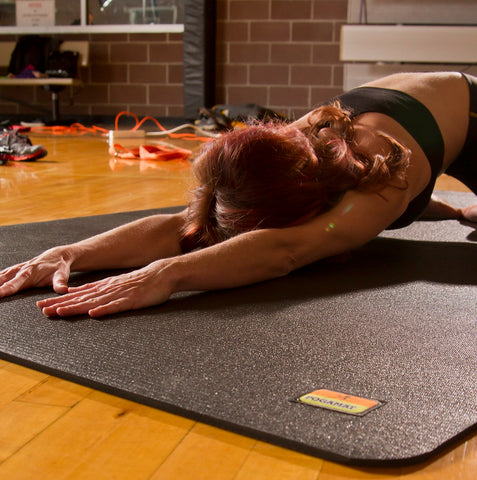
Why is Yoga so Good For Back Pain?
Certain yoga postures can help lengthen your spine, strengthen and stretch your muscles and return your back into proper alignment. Yoga’s focus on balance and steadiness help your body to strengthen abdominal and pelvic muscles, as well as increase flexibility in the hips. All of these are defenses against back pain caused by weak muscles in these areas. Additionally, when you strengthen these muscles, you improve your posture, which reduces the load on your back. In addition, stretching can increase flexibility by increasing blood flow to tight muscles and give you additional extension in your lower back by increasing the space between the discs and allows for a little more breathing space around the spinal cord.
If you are suffering from an injury in which you are unable to handle a strenuous workout or do high-intensity physical activity, yoga classes labeled as restorative, gentle, or therapeutic could benefit someone with back pain. Once again, it's always a good idea to ask your doctor before beginning a yoga program, especially if you're prone to pain. Once you get the go ahead, try these soothing poses for back pain. You can do these poses in any order. Gradually increase the intensity by holding them for longer amounts of time. The added bonus is that these poses can be done at home (or anywhere).
Yoga Poses For Back Pain
Grab your Pogamat, lay it out wherever you are and try one, a few or all of these poses out. See what feels good in your body!
Cat/Cow Pose-
Why? When your lower back hurts, you may not want to move it, but gentle movement can actually make your back feel better. Cat and cow poses are a great way to add in gentle movement to reduce back pain.
How? Start the pose on your hands and knees (table top position). Inhale, draw your gaze upwards and arch your back like a cat. Then exhale and lower to a slightly arched position drawing your eyes toward your belly button. Go back and forth slowly for eight to 12 repetitions. Move the lower back slowly and within a pain-free level to improve range of motion.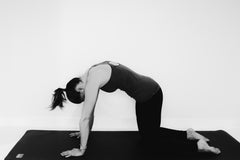
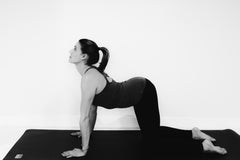
Downward dog-
Why? This classic yoga pose is a great total body stretch that targets back extensors: the large muscles that help form your lower back, support your spine and help you stand and lift objects.
How: Start on your hands and knees (table top position), with your hands slightly in front of your shoulders. Pressing back, raise your knees, lift your hips up and back, away from the floor and lift your tailbone up toward the ceiling. Hold the position for 5 to 10 breaths, and repeat the pose five to seven times.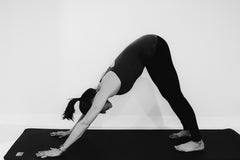
Sphinx Pose-
Why? The Sphinx is a great pose for toning and lengthening the spine and stimulating the sacral-lumbar arch. When we sit a lot, the lower back tends to flatten, which can cause pain. Sphinx pose promotes the natural curvature of the lower back.
How: Start by laying on your stomach, feet hip-width apart, and bring the elbows under the shoulders. If there is too much pressure on your lower back, you can bring your elbows slightly forward. Hold the pose for three breaths (over time increase to 1-3 minutes), and come out by first lowering your upper body on to the floor. Relax on the floor as long as needed.
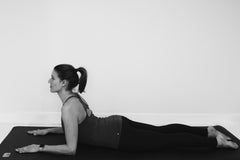
Bow Pose-
Why? The ligaments, muscles, and nerves in the back are given a good stretch and the spinal column is rejuvenated. It is beneficial for treating slipped discs. It helps improve posture and reduce hunching.
How: Starting facedown on your stomach, reach for your heels and lift them up. Your back will naturally come with you. Stay lifted for three breaths. **It is an intense pose so listen to your body if it is too much.
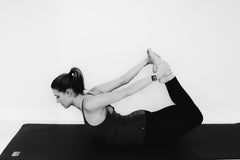
Child’s Pose-
Why: Child’s pose is an active stretch that helps elongate the back.
How: Start on all fours, sit your hips back toward your heels (big toes touching) while simultaneously walking your arms out in front of you. Hold the position for 5 to 10 breaths, and repeat as many times as needed for a good, soothing stretch.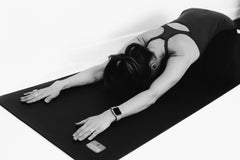
Low Lunge-
Why? Helps open up the hips which can significantly impact the back. It’s a great pose for sciatica.
How? Step right foot forward between the hands. Aim to place the foot right below the knee so the shin is vertical. You can keep hands on the mat for balance or reach the arms up over your head to lengthen the spine and open the chest. Repeat on the left side.
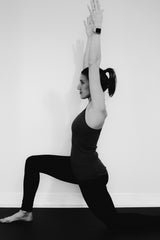
Standing Forward Fold-
Why? This pose increases shoulder mobility and opens up your chest, offering a great back stretch.
How? Start in an upright standing position, hinge your hips forward and bring your fingertips toward the ground. Clasp your hands behind you and bring your palms to together, even if that means bending your elbows. Hold for three breaths.
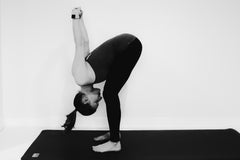
Seated Spinal Twist-
Why? A lot of lower back pain can stem from weak core muscles, so prevent the pain in the first place with this pose aiding in a solid core.
How? Begin seated in staff pose with legs long and in front of you. Bend right knee and place right foot on the ground outside left thigh. Turn torso to the right and take your right hand to the ground behind sacrum. Gently hug right leg with left arm to twist. Use each inhale to lengthen your spine, and use each exhale to press into the ground and twist. Keep this breathing pattern for 5 to 10 deep breaths. Repeat on the other side.
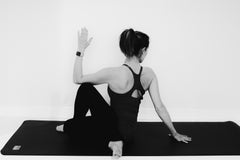
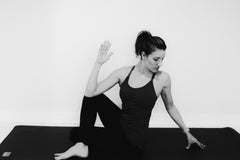
Bridge Pose-
Why? Reduced pain in the lumbar and lower back as it lengthens back muscles.
How? Begin by laying down on your yoga mat, and position your feet about hip distance apart. Press through your heels to lift your hips. Option to slide a block underneath your low back so it fits snug and comfortably against it. Release all pressure through your heels so your hips are fully supported by the block. Close your eyes and breathe three to five deep breaths in this position.
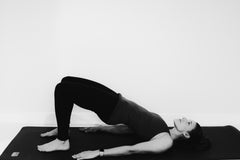
Try a few or all of these poses and stick to them regularly (once a day) for about a month. Or try out a nearby yoga class! See if you feel a noticeable improvement in the way your back feels! Take our word for it, it'll be worth it!
Leave a comment
Comments will be approved before showing up.
Also in Pogamat Blog

Buy Yoga Mats That Last: The Durability and Design of Pogamat

At Home Workouts Comprehensive Guide Staying Fit in Your Living Room

